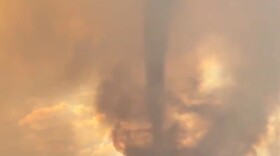Skies are hazy across the region thanks to the many wildfires burning in the West, and that smoke is more dangerous during the pandemic.
It can cause health problems, like inflammation and an impacted immune system, and make lungs more prone to infection. That's why Kim Deti with the Wyoming Department of Health is encouraging people to limit their exposure to smoke.
"It really comes down to maybe not spending so much time outdoors," she said. "If you can really see the smoke, and smell it, taste it, in your community, boy, it sure is not a good idea, not a good day to run a marathon."
Plus, cloth masks or face coverings that people have been using to protect themselves from COVID-19, offer little protection against wildfire smoke, since they don't catch those tiny particles that can irritate your lungs.
The Centers for Disease Control and Prevention recommend using an air purifier inside that has high efficiency HEPA filters and is the right size for the room.
While the virus and exposure to wildfire smoke do share some symptoms, like a dry cough or a sore throat, Deti said there are some big differences.
"Wildfire smoke exposure is not going to cause a fever, and it's not going to cause body aches, and those are some of the more common symptoms with COVID-19," she said.
Have a question about this story? Contact the reporter, Maggie Mullen, at mmullen5@uwyo.edu.
This story was produced by the Mountain West News Bureau, a collaboration between Wyoming Public Media, Boise State Public Radio in Idaho, KUNR in Nevada, the O'Connor Center for the Rocky Mountain West in Montana, KUNC in Colorado, KUNM in New Mexico, with support from affiliate stations across the region. Funding for the Mountain West News Bureau is provided in part by the Corporation for Public Broadcasting.
Copyright 2020 Wyoming Public Radio







